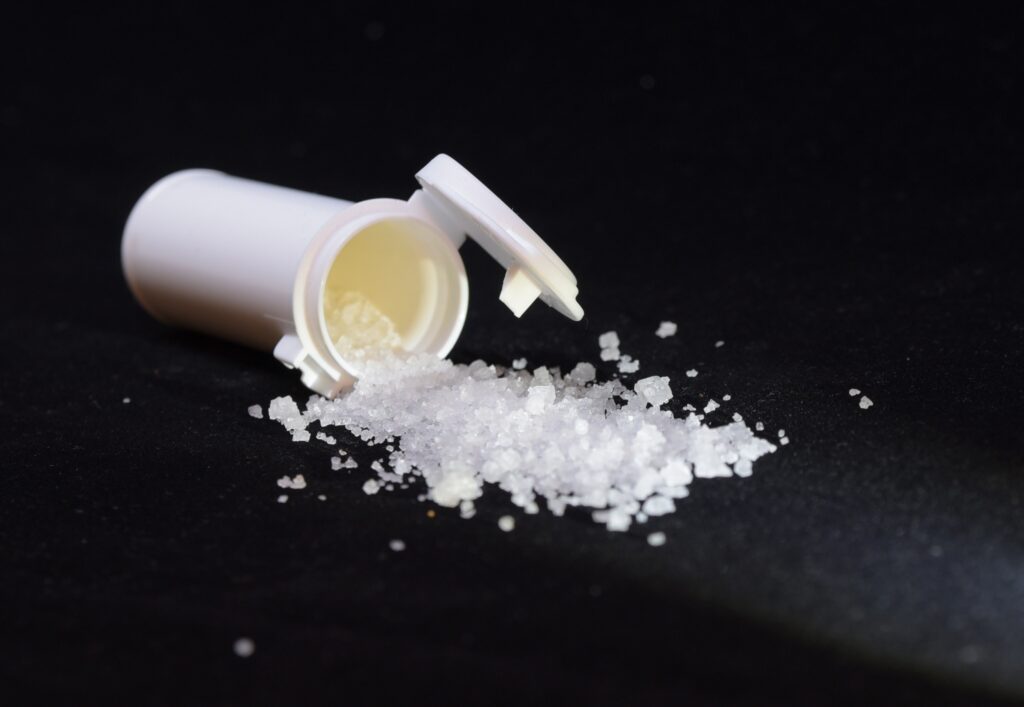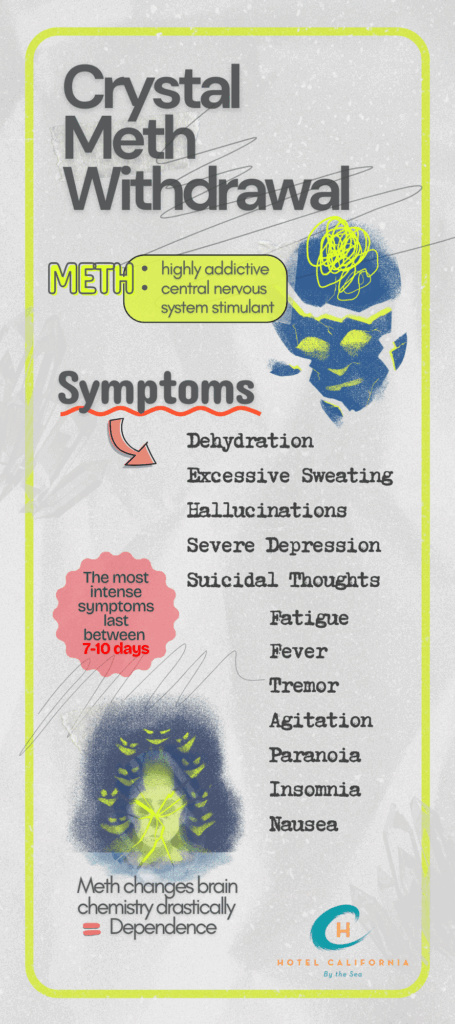Crystal Meth Withdrawal Symptoms
Meth abuse is big in America. The drug’s high potency will often lead to meth dependence, resulting in meth withdrawal. Crystal meth is one of the most potent forms of the drug. In most cases of recreational use and abuse of the drug, it leads to uncomfortable and dangerous crystal meth withdrawal symptoms.

Crystal meth is highly addictive. It impacts the dopamine production in the brain, easily causing the development of an addiction. When crystal meth enters the body, it floods the brain with dopamine, causing feelings of pleasure and reward. The brain is able to quickly adapt to this and starts relying on the drug to trigger these feel-good emotions.
Repeated drug use will begin to change the brain function in the reward system. The brain will reinforce using meth over other natural rewards, such as eating and having sex. This makes it so that other activities that usually cause a natural spike in dopamine will no longer be pleasurable compared to the intense high from meth.
Methamphetamine
Methamphetamine or meth or crystal meth, is a highly addictive central nervous system stimulant. The Schedule II controlled substance is a popular street drug. On its own, it can be very dangerous. However, meth is often cut or mixed with other substances such as fentanyl. This highly potent opioid causes further potency, potential for addiction and a higher risk of overdose.
When used recreationally or abused, it can change brain chemistry. Changes in brain chemistry can impact many vital functions, including memory, coordination, emotional regulation, decision-making skills, learning ability, mood and motivation.
Meth impacts brain receptors and temporarily alters brain chemistry. The more a person uses the drug, the greater the changes become, making them more dependent and addicted to the drug. It can create a high that lasts anywhere from 5-30 minutes with lingering effects that can last up to 12 hours. Once a user has developed tolerance to the drug, they will need to take more in order to experience the same effects.

Meth Withdrawal
Once drug use has stopped, users will experience withdrawal symptoms as the brain and body work to rebalance and cope without the aid of crystal meth in the system. Highly addicted crystal meth users will experience withdrawal that can last as long as several weeks.
When drug use has stopped, the brain must quickly adjust to the changes and work to bring brain chemistry and brain functioning back to the baseline from which it was before drug use started. Sometimes this causes chaos in the brain, leading to what is known as withdrawal symptoms.
A 2010 study found that withdrawal symptoms are at their highest intensity at 24 hours after meth use has stopped. These symptoms often include meth cravings, food cravings and depression. Most meth withdrawal symptoms will resolve within about 14 days. In some cases, a person can experience withdrawal symptoms for up to 5 weeks or more.
A few factors that impact withdrawal include the length of time meth was used, the amount of meth that was used, how frequently meth was used, if other substances were used and the method of drug consumption. Meth injections typically have a longer experience as well as a more intense withdrawal experience. Smoking meth will have a quicker onset of effects as well as a more intensified experience.
Crystal Meth Withdrawal Symptoms
- Fatigue
- Agitation and mood swings
- Insomnia and other sleep problems
- Excessive sweating
- Paranoia and psychosis
- Hallucinations
- Fever
- Red and itchy eyes
- Confusion
- Nausea
- Loss of motivation
- Tremors
- Suicidal thoughts and behaviors
- Anxiety and depression
- Dehydration
- Intense meth cravings
- Headaches
- Weight loss
- Inability to feel pleasure
- Low energy
- Poor concentration
Acute meth withdrawal symptoms are the most intense and last between 7-10 days. Post-acute withdrawal symptoms from meth are considered the second phase of withdrawal. Symptoms are less severe but still continue to linger. It can last a few weeks or even as long as a few months.
Check Your Insurance Coverage for FREE
Find out if your insurance covers addiction treatment in minutes. We accept most insurance!
Meth Withdrawal Timeline
In the first 48 hours after drug use has stopped, meth has consumed most of the body’s resources and users will experience a crash or meth comedown. The body becomes depleted of energy and becomes vulnerable to disease. Users will begin to feel symptoms of a decline in cognitive functioning, excessive fatigue and sleepiness, nausea, cramping and excessive sweating.
By days 3-10, patients will begin to experience unease, paranoia and severe depression, leading to suicidal thoughts and behaviors. They may also experience extreme fatigue, muscle aches and intense meth cravings.
During the next 2-3 weeks is where patient’s symptoms begin to ease up. However, they can still experience persistent symptoms such as insomnia, slowed heart rate, mild drug cravings, fatigue and continued depression.
Some users continue to experience symptoms over the next few months. Symptoms of anxiety and depression can linger while others have subsided. This enters the acute withdrawal phase. It can vary in intensity depending on how long and how heavy a person’s meth addiction was. It is characterized by anxiety, fatigue, insomnia, nightmares, slowed movement and slowed cognitive thinking.
How to Detox from Meth
Evaluation. During this beginning stage of detox, patients will be assessed by a medical provider and together will develop a plan for action. This plan will help set up the patient for long-term recovery, including treatment of any co-occurring disorders.
Stabilization. During this process of detox, patients will begin to experience meth withdrawal symptoms. Medication-assisted treatments may be used to help stabilize the patient and keep them comfortable and safe during intense withdrawal symptoms.
Common medications used include antidepressants like Wellbutrin, Prozac and Paxil. Stimulants like modafinil and dextroamphetamine. Anti-nausea medications like Zofran. Aripiprazole can be used to treat meth induced psychosis. Isradipine is a high blood pressure medication used to treat meth induced hypertension.
A 2010 study published in the British Journal of Clinical Pharmacology found that medications like bupropion and naltrexone showed effectiveness in helping to reduce overall meth use.
However, there is currently no officially approved treatment medication used specifically for meth withdrawal or detox. Most of the medications used are used to treat specific symptoms of meth withdrawal.
Once the patient has been stabilized and fully detoxed, they will transition into further treatment, usually in a residential inpatient program.
Reach out to Hotel California by the Sea
We specialize in treating addiction and other co-occurring disorders, such as PTSD. Our Admissions specialists are available to walk you through the best options for treating your addiction.
Treatment for Meth Use Disorder
Crystal meth withdrawal symptoms can be uncomfortable, frustrating and can disrupt daily life activities. This, in turn, can increase the risk of relapse. Meth withdrawal can be so intense, painful and debilitating that it can cause the user to go back to using the drug just to avoid experiencing withdrawal symptoms.
Depression is one of the trademark symptoms of meth withdrawal. For some, it gets so bad that they would prefer to return to drug use just to help them reduce their depressive thoughts and behaviors. Professional behavioral treatment programs like Hotel California by the Sea provide treatment for meth use disorder, which includes treating detox and withdrawal symptoms.
We offer treatment at all levels of care, including detox, residential, PHP and IOP. We utilize evidence-based treatment methods such as CBT, DBT and group therapy. Hotel California by the Sea is dedicated to helping clients reach their goals of sobriety and overcome their addiction.
References:
https://www.addictioncenter.com/drugs/meth/withdrawal-detox
https://www.medicalnewstoday.com/articles/meth-withdrawal-symptoms
https://www.addictionhelp.com/meth/withdrawal-symptoms
https://www.drugrehab.com/addiction/drugs/crystal-meth/withdrawal
https://www.bicyclehealth.com/blog/getting-off-methamphetamines
